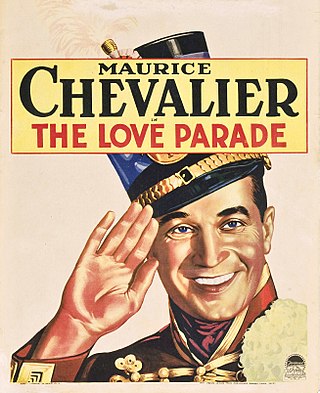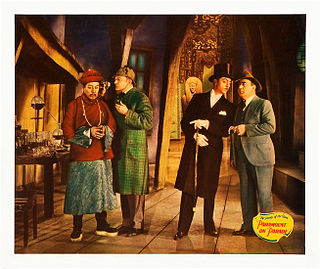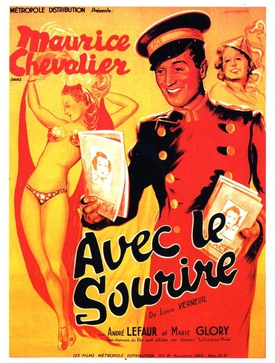Related Research Articles

Maurice Auguste Chevalier was a French singer, actor and entertainer. He is perhaps best known for his signature songs, including "Livin' In The Sunlight", "Valentine", "Louise", "Mimi", and "Thank Heaven for Little Girls" and for his films, including The Love Parade, The Big Pond, The Smiling Lieutenant, One Hour with You and Love Me Tonight. His trademark attire was a boater hat and tuxedo.

The Love Parade is a 1929 American pre-Code musical comedy film, directed by Ernst Lubitsch and starring Maurice Chevalier and Jeanette MacDonald, involving the marital difficulties of Queen Louise of Sylvania (MacDonald) and her consort, Count Alfred Renard (Chevalier). Despite his love for Louise and his promise to be an obedient husband, Count Alfred finds his role as a figurehead unbearable. The supporting cast features Lupino Lane, Lillian Roth and Eugene Pallette.

The Folies Bergère is a cabaret music hall, located in Paris, France. Located at 32 Rue Richer in the 9th Arrondissement, the Folies Bergère was built as an opera house by the architect Plumeret. It opened on 2 May 1869 as the Folies Trévise, with light entertainment including operettas, comic opera, popular songs, and gymnastics. It became the Folies Bergère on 13 September 1872, named after nearby Rue Bergère. The house was at the height of its fame and popularity from the 1890s' Belle Époque through the 1920s.

Collioure is a commune in the southern French department of Pyrénées-Orientales.

Christian Volckman is a French film director, author, and painter. He is a graduate of Ecole Supérieure d'Arts Graphiques in Paris.

Paramount on Parade is a 1930 all-star American pre-Code revue released by Paramount Pictures, directed by several directors including Edmund Goulding, Dorothy Arzner, Ernst Lubitsch, Rowland V. Lee, A. Edward Sutherland, Lothar Mendes, Otto Brower, Edwin H. Knopf, Frank Tuttle, and Victor Schertzinger—all supervised by the production supervisor, singer, actress, and songwriter Elsie Janis.
Robert Coin (1901–1988) is a French sculptor and engraver, born in Saint-Quentin on 17 December 1901. He died in Lille on 12 February 1988.

Isabelle Geffroy, known professionally as Zaz, is a French singer and songwriter who mixes jazz, French variety, soul and acoustic. She is known for her single "Je veux", taken from her self-titled debut album, released on 10 May 2010. Worldwide Zaz has sold over 5 million albums, including 2 million outside France.
Henri Bourtayre was a French composer.
Henri Betti, born Ange Betti, was a French composer and a pianist.

Playboy of Paris is a 1930 American pre-Code musical comedy film directed by Ludwig Berger and starring Maurice Chevalier, Frances Dee, and O.P. Heggie. It was based on a 1911 play The Little Cafe by Tristan Bernard which had previously been adapted into a 1919 French silent film. Paramount produced a separate French-language version Le Petit Café, also starring Chevalier, which broke records for an opening-day attendance in Paris.
Maurice Yvain was a French composer noted for his operettas of the 1920s and 1930s. Some of which were written for Mistinguett, at one time the best-paid female entertainer in the world. In the 1930s and 1940s, he became a major success in the United States and several of his pieces appeared in the famous Ziegfeld Follies on Broadway. He also composed music for several films of notable directors such as Anatole Litvak, Julien Duvivier, and Henri-Georges Clouzot. Yvain's music blended with the then "spirit of Paris".
"Si" is a song by French singer-songwriter Zaz, released as a single from the 2013 album Recto Verso.

With a Smile is a 1936 French comedy film directed by Maurice Tourneur and based on an original screenplay by Louis Verneuil. The film stars Maurice Chevalier and the title of the film is taken from one of his comic songs "With a Smile".

"Pasos de cero" is a song recorded by Spanish singer-songwriter Pablo Alborán. It was released as the second single from his third studio album, Terral. The song was written by Alborán and produced by Eric Rosse.

Guillaume Poncelet is a French musician, composer, trumpet and piano player, born in Grenoble, France.

Slimane Nebchi, known professionally by the mononym Slimane, is a French male singer and songwriter. Nebchi won season 5 The Voice: la plus belle voix in 2016, and has since released a debut album and nine singles.
Raymond Paul Legrand was a French composer and conductor.
"Valentine" is a song by French actor, cabaret singer and entertainer Maurice Chevalier. Its first public performance was in 1925. The song was strongly associated with him, and his imitators use it as "an instant identification symbol". Chevalier performed the song, in French, in two American movies, Innocents of Paris (1928) and Folies Bergère de Paris (1935), but to not offend American sensibilities the word tétons (breasts) was replaced with a mysterious piton, which translates as peg or protuberance. "Piton" was needed for the rhyme scheme, but Chevalier always pointed to his nose at that moment in the song, to indicate what part of his lover's anatomy he was supposedly fondling.
References
- ↑ "Maurice Chevalier - Paris sera toujours Paris - ultratop.be".
- ↑ "Zaz – Paris Sera Toujours Paris" (in Dutch). Ultratip.
- ↑ "Zaz – Paris Sera Toujours Paris" (in French). Ultratip.
- ↑ "Zaz – Paris Sera Toujours Paris" (in French). Les classement single.